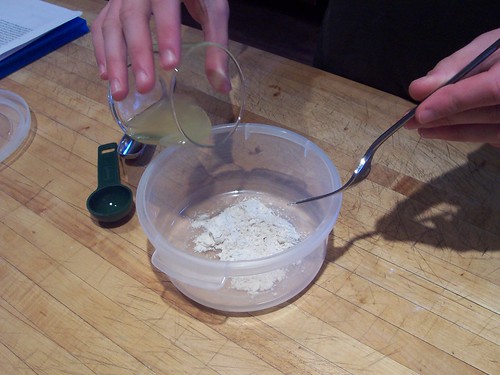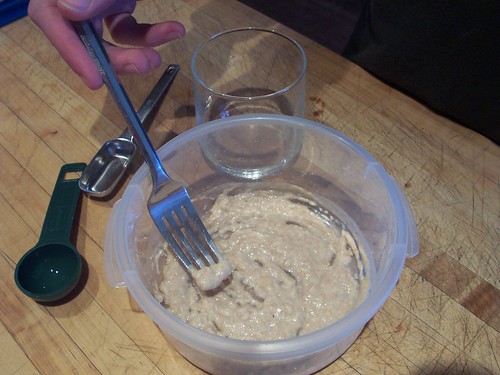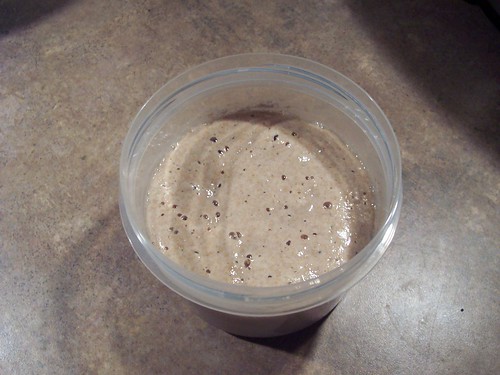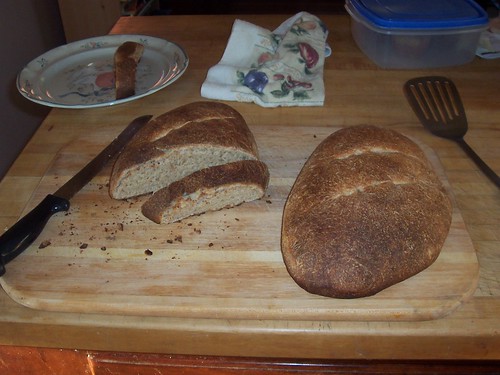The yeast starter The finished loaves
Last week, we were trying out a yeast experiment that didn't work out in time for the post, but this week we have successfully finished the project: making sourdough bread using home-grown yeast.

Growing Yeast (Or "Starter")
Source: Recipe Zaar
Ingredients:
1/2 cup unsweetened pineapple juice
1/2 cup whole wheat flour
1 cup unbleached all-purpose flour
2 cups water
DAY ONE: Mix 2 Tablespoons flour and 2 Tablespoons pineapple juice. Stir well, cover and let sit for 24 hours at room temperature.

DAY TWO: Add 2 Tablespoons flour and 2 Tablespoons pineapple juice. Stir well, cover and let sit another 24 hours at room temperature. We started to see bubbles.
DAY THREE: Add 2 Tablespoons flour and 2 Tablespoons pineapple juice. Stir well and let sit 24 hours at room temperature.
DAY FOUR: Stir mixture and measure out 1/4 cup--discard the rest. To the 1/4 cup, stir in 1/4 cup flour and 1/4 cup water. Let sit 24 hours at room temperature.
REPEAT Day Four until mixture expands to double its size and smells yeasty.

The starter being poured into a bowl
Updated: Kathy's Foolproof (!) Whole Wheat Sourdough Recipe
To make a loaf for supper, I make the sponge the night before, make the dough after breakfast, shape the loaf after lunch and turn on the oven to bake the bread (no preheating) about 35 minutes before I need to start making supper. Then I use the hot oven for whatever I'm making that night.
Ingredients:
3 cups of sponge (proofed starter)
1 cup whole wheat flour
2 cups white flour (less or more as needed)
4 teaspoons of sugar
2 teaspoons of salt
1 tablespoon of olive oil
- To make the sponge, add one cup water and one cup whole wheat flour to starter in large bowl. Let sit out overnight (or at least 2 hours). If you use a glass bowl, you can check that it is bubbly all the way through.
- Measure out the sponge for the bread into a large mixing bowl. Take the leftover starter and add one cup water and one cup flour. Mix, cover, and return to the refrigerator.
- Take the sponge for the bread and add the sugar and salt. Mix well, then knead in the flour a half-cup at a time. Knead in enough flour to make a good, flexible bread dough. The dough should stretch, not tear, when you fold it.
- Pour oil into bowl. Put dough in bowl and turn until covered in oil. Let rise, loosely covered, in a warm place (like an oven heated for 1-2 minutes) for ~3 hours, or until doubled.
- Place dough on baking tray. Gently knead and shape into a loaf. Make three gashes across the top. Let rise again, loosely covered, 2-3 hours.
- Remove covering on loaf. Sprinkle with water. (This makes the crust crispy.) Turn oven on to 425 degrees F. (No preheating needed.) Bake about 35 minutes, or until brown and fragrant. Loaf should sound "hollow" when tapped on bottom.
ALSO NOTE: The liquid that sometimes separates out is called hootch, and smells like it! Just stir it back in.
The two loaves made on our second try. (Ready to go into the oven.)
Some links we used:
Breadtopia video
Microbiologist Debra Wink's sourdough experiment
Sourdough use and maintenance tips from King Arthur flour
Sourdough basics by S. John Ross













2 comments:
This is so exciting. Thank you for posting it. I have always wanted to try this but never quite understood the directions before.
I just realized that it doesn't note that for the starter we used only whole wheat flour, which is supposed to have more live yeast. We used half whole wheat and half white flour for the final loaves. They actually came out very "soft" and spread more than they rose. I will probably try more flour (of whatever type) next time.
Note that you have to remove a cup of starter every week and feed it more flour. We're using the discarded starter tonight to make Belgian waffles!
Post a Comment